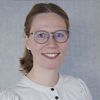The day before this interview took place, Johan von Schreeb from Karolinska Institutet gave a digital lecture to PhD students researching crisis management and response at Gaza Islamic University. When the PhD students turned on their microphones, their questions were drowned out by the sound of drones.
"It was difficult for them to ask questions because of the noise from the drones, but we discussed, among other things, how they can validate data and compare it with other data sources to ensure that it is reliable and not politically manipulated. It was very strange and surreal to teach the students with the sound of drones in the background, but they told me that if we can conduct teaching like this, then there may be hope," says Johan von Schreeb, adding an important point:
“It suddenly became very clear to me that what we are doing in our newly established research network is highly relevant. It was rewarding to be able to teach and share experiences with the students in Gaza.”
The new research network is called the Nordic Health Crises University Network and is part of NordForsk's focus area on societal security. Researchers from the University of Stavanger, Roskilde University, Hanken School of Economics, the University of Copenhagen and the University of Iceland are participating in the network.
More about the Nordic Health Crises University Network
The starting point is that universities possess a wealth of expertise and knowledge that is often underutilised in health crises. Through increased interdisciplinary, Nordic, collaboration and problem-solving within academia, and in partnership with other societal actors, this expertise and knowledge can reach out to help support decision-making and catalyse policy and behavioural change. This in turn would make Nordic societies better prepared for future health crises.
Like the Centre for Health Crises, the network has an all-hazards perspective on health crises and has a Nordic perspective in its work. It focuses in particular on two thematic areas: pandemic preparedness and response, and extreme weather events and climate change.
Source: Nordic Health Crises University Network | Karolinska Institutet
Help when global health crises occur
Johan von Schreeb has a background as a surgeon and in global disaster medicine and has worked for Médecins Sans Frontières and the WHO. Among other things, he was stationed in Sierra Leone when Ebola broke out in West Africa in 2014.
“All airlines suspended their flights, making it difficult to get international organisations into the country to help. It was a chaotic situation, with untrained staff having to help, a lack of financial aid, and the need to build many Ebola treatment centres. We soon trained local staff to handle Ebola and use protective equipment to prevent infection," he says, adding:
"Sweden also wanted to contribute, but before a team could be sent, it was crucial that they received practical training. We at Karolinska Institutet ensured that Swedish staff received the same training as staff in Sierra Leone. That was when I realised that universities play an important role in health crises. It was the same type of training we carried out during the Covid-19 pandemic for Swedish healthcare workers," says Johan von Schreeb.
"In general universities don’t have a clarified role in crises, except for maintaining normal services. To what extent universities can add other functions, such as providing expertise needs to be decided and developed."
Karolinska Institutet contributed in various ways during COVID-19, and based on these experiences, universities could take a leading role in future crises.
"The traditional role of researchers at the university is to teach and be happy when their research is published, but does that change anything in society? Contributing expertise in the field during disasters is a new role for the university. Many professors did not know what to do during the pandemic and began to ask how they could contribute. What we want to achieve with this network is to ensure that what we do as universities is relevant."




